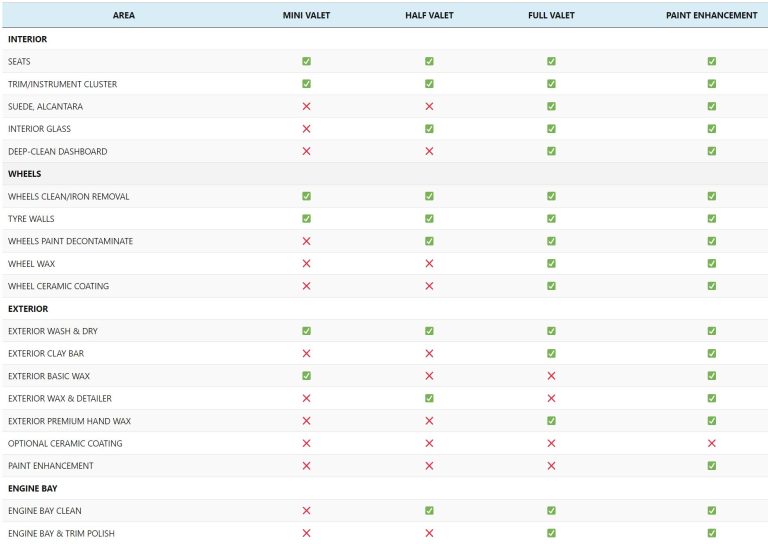Welcome to North Detailing‘s ultimate guide to professional car detailing.
Whether you’re a seasoned driver or a new car owner, the world of automotive care can seem intricate, with terms like ‘detailing‘ and ‘valeting‘ often being misunderstood.
In this guide, we aim to simplify these concepts for you, distinguishing between the two and highlighting what a full detailing service entails.
As we delve into the importance of this often overlooked realm of car maintenance, we hope to illuminate how car detailing is indeed a worthwhile investment for every vehicle owner.
Contents – Click to jump
1. What is Included in a Full Car Detail?
1.1 Does Detailing Remove Scratches?
1.2 How Long Does It Take to Detail a Car?
1.3 Does My Car Need to Be Detailed?
1.4 What is Claying/Clay Bar Use?
2. What is the Difference Between Car Detailing and Car Valeting?
2.1 Why is Car Detailing So Expensive?
2.2 Is Interior Detailing Worth It?
2.3 What Vehicle Parts Are Cleaned?
2.4 Does It Increase the Value of the Car?
3. How Much Does It Cost to Get a Detail?
3.1 How Often Should I Get My Car Detailed?
3.2 What are the stages when polishing a car?
3.3 North Detailing Services
What is Included in a Full Car Detail?
A full car detailing service is a comprehensive procedure designed to rejuvenate your vehicle inside and out, surpassing a basic car wash to deliver a gleaming, showroom-quality finish.
This process starts with a thorough decontamination, eliminating dirt and grime, preparing the vehicle for the next stages.
Post decontamination, the vehicle undergoes clay barring, a method that lifts deep-seated contaminants from the paintwork, creating a smooth surface.
Next comes the cut and polishing phase, where minor imperfections like scratches are smoothed out, reinvigorating the car’s exterior lustre.
The final touch is the application of a protective layer, like a high-quality wax or a durable ceramic coating. This not only enhances your car’s aesthetic appeal but also guards against harsh environmental factors.
In summary:
- Wash – decontamination, cleaning of all exterior surfaces
- Drying – remove any water residue
- Clay and prep – removing stubborn contaminants from all surfaces
- Polish – cut/polish with compound to remove scratches & swirls
- Protect – Wax or ceramic sealant to prevent future damage
- Interior – Clean and decontaminate interior including engine bay
Does detailing remove scratches?
An integral part of car detailing lies in the paint correction process. This involves a detailed and careful procedure, specifically tailored to address the minor scratches, swirl marks, and other paint imperfections that can compromise the aesthetics and overall value of your vehicle.
A skilled detailer utilises specialised buffing and polishing tools for this purpose. They patiently work their way across the vehicle’s exterior, meticulously smoothing out each imperfection on the paintwork. This is not merely a process of restoration; it is a delicate art of bringing back the original beauty of the car’s paintwork.
Following the paint correction, we move onto paint enhancement. This stage is all about amplifying the lustre and shine of the vehicle. It’s not enough to merely restore the car’s original appearance; the goal is to take it a step further. Using high-quality products, the detailer will enhance the gloss and depth of the paintwork, resulting in a remarkable, mirror-like finish.
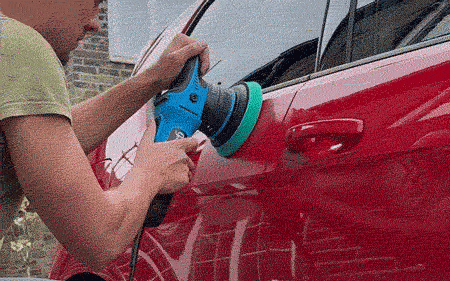
How long does it take to detail a car?
The timeframe required for a comprehensive car detail is not a fixed measure but instead, it varies based on a multitude of factors. Predominantly, it depends on the current condition of the vehicle and the degree of detail that the service entails.
If your vehicle has been regularly maintained and is in good shape, the detailing process may take less time. However, for vehicles that require more attention due to neglect, dirt build-up, or damage, the process can extend to ensure each issue is meticulously addressed.
Moreover, the level of detail you choose plays a significant role in determining the duration. A basic detail might include exterior washing, interior vacuuming, window clean and tyre shine, which could be completed in a few hours. On the other hand, a full detail includes exhaustive services such as deep interior cleaning, paint correction, waxing or ceramic coating application, engine cleaning and more, which inevitably require a greater investment of time.
Typically, a thorough, high-quality full detail process takes anywhere between 5 to 8 hours, and sometimes even longer. This duration ensures that the detailer has ample time to inspect and clean every nook and cranny of your vehicle, from the deepest fibres of the carpet mats to the tightest corners of the engine bay.
Does my car need to be detailed?
Every car, irrespective of its make, model or age, can significantly benefit from regular detailing. This is not merely about maintaining a shiny appearance, though that is indeed a delightful outcome. Car detailing is a vital part of vehicle maintenance that goes beyond the surface level to protect your investment and enhance its longevity.
Many people also ask if their new car needs a detail (Spoiler: it often does!). However, we have specifically produced a new car detailing guide that covers this topic.
Detailing helps preserve your car’s appearance, just as routine mechanical maintenance ensures its smooth operation. Over time, your vehicle is exposed to various environmental elements like UV rays, bird droppings, road salt, and acid rain, all of which can degrade the paintwork. Regular detailing provides a protective barrier that shields your vehicle’s exterior from these elements, preventing fading, scratches, and rust.
Regular car detailing is a proactive approach to preserving the value of your vehicle. Just as a well-serviced car performs better and lasts longer, a well-maintained car retains a higher resale value. Prospective buyers are likely to pay more for a car that looks well cared for and is in excellent condition, both mechanically and aesthetically. So, investing in regular detailing can provide substantial returns if you ever decide to sell your vehicle.
In essence, the question isn’t so much “Does my car need to be detailed?” but rather “How often should I get my car detailed?” Given the numerous benefits, including aesthetic enhancement, value preservation, and overall maintenance, regular detailing should be an integral part of your vehicle care routine.
What is a clay bar?
Clay bar is a powerful tool used in car detailing for deep cleaning the vehicle’s exterior surfaces. Made from a malleable, resin mixture, it is designed to remove embedded contaminants that regular washing cannot tackle. This includes pollutants, tar, tree sap, bug residue, and more that latch onto the paintwork, giving it a rough texture.
Using a clay bar, detailers are able to extract these particles from the surface, resulting in a smooth-as-glass finish that is not only pleasing to the touch but also essential for the following stages of detailing. This is because any remaining contaminants can cause scratches or swirl marks during polishing and waxing.
Recently, there’s been an innovation in this arena – the clay bar mitt. Also known as a clay mitt, this is a detailing tool that combines the effectiveness of a traditional clay bar with the ease of a wash mitt. With a microfibre mitt on one side and a polymer rubber face on the other, it offers a more ergonomic design, allowing for a larger surface area to be cleaned in less time.
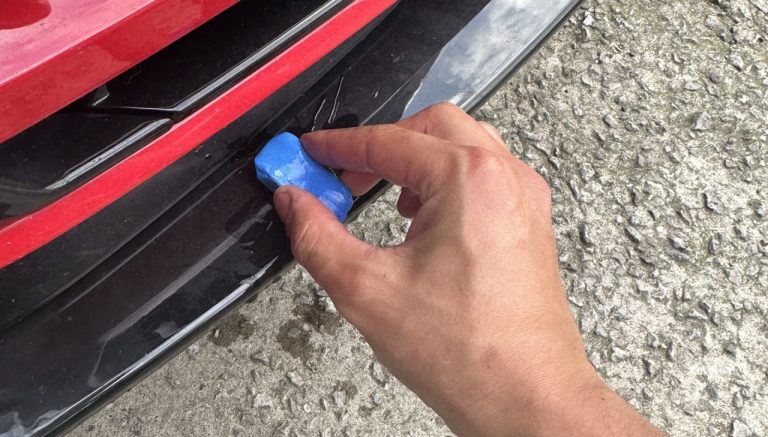
What is the Difference Between Car Detailing and Car Valeting?
Car valeting and car detailing both strive towards the same goal – achieving a clean and aesthetically pleasing vehicle. However, the scope and the intensity of these two services differ significantly, leading to distinct outcomes.
Car valeting, on one hand, is a surface-level cleaning service. This typically involves exterior washing, interior vacuuming, window cleaning, and sometimes, tyre shine application. Valeting aims to make your vehicle look presentable and tidy by taking care of visible dirt and dust. The service is quick and convenient, offering a noticeable improvement in your car’s cleanliness, but it doesn’t delve into in-depth restoration or protection.
Car detailing, on the other hand, is a much more thorough and intensive process. Detailing goes beyond merely cleaning your vehicle; it aims to fully restore, enhance and protect all parts of your car, both inside and out. A comprehensive detailing service may include deep interior cleaning, paint correction, waxing or ceramic coating, engine bay cleaning and more. Detailing aims to bring your vehicle as close to showroom condition as possible.
While detailing your car requires a significant time investment compared to valeting, the results are often far more remarkable. Not only does detailing provide a more profound aesthetic transformation, but it also safeguards your vehicle against future wear and tear, which ultimately helps to maintain its value.
Why is car detailing so expensive?
Car detailing is a thorough and meticulous process that involves much more than a simple wash and dry. To understand why it can be perceived as expensive, it’s essential to delve deeper into the complexities of this service and contrast it with a standard valet.
Firstly, car detailing is labour-intensive and time-consuming. A detailed car treatment goes beyond a surface clean and involves a series of steps, each requiring a significant investment of time and effort. From pre-washing and decontamination to claying, polishing, waxing, and interior deep cleaning, each step is methodically carried out with precision and attention to detail.
Secondly, car detailing employs specialised tools and high-quality, often professional-grade products. These materials are chosen not just for their superior performance, but also for their ability to treat and protect various surfaces in your vehicle, without causing damage. The cost of these premium tools and products is reflected in the price of a detailing service.
Moreover, procedures like paint correction, deep cleaning of the interior, and applying protective coatings are tasks that demand a high level of expertise. These are not just about removing visible dirt, but restoring, enhancing, and protecting your vehicle’s surfaces. This means that a detailer’s experience, skills, and knowledge are factored into the cost.
Is interior detailing worth it?
interior detailing is worth every penny. It involves deep cleaning of the seats, carpets, dashboard, and all other surfaces, removing stains, dirt, and bad odours, while also applying products to protect against future spills and damage. This maintains the aesthetic appeal and can significantly increase comfort and enjoyment while driving.
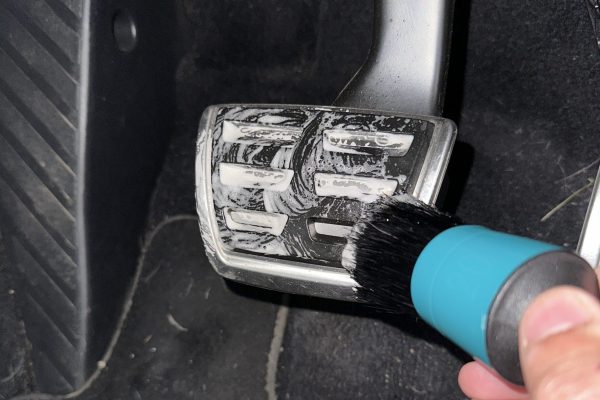
What vehicle parts are cleaned?
In a comprehensive car detailing service, almost every part of your vehicle is meticulously cleaned and treated. While the exact services can depend on the package chosen, a full detailing service generally includes the following components:
- Exterior Body: This includes washing, decontaminating, claying, polishing, and sealing or waxing the vehicle’s paintwork.
- Windows and Mirrors: They are thoroughly cleaned, polished, and treated with a rain-repellent product.
- Tyres and Wheels: These are deep cleaned, with the wheel arches and brake calipers also attended to. Tyres are usually dressed with a tyre shine product for a glossy finish.
- Underbody: Some detailing services will also clean and protect the vehicle’s underbody.
- Engine Bay: This is often degreased, cleaned, and dressed with a protective product.
- Interior Surfaces: All interior surfaces, including dashboard, centre console, door panels, and seats (whether leather or fabric), are deep cleaned and conditioned.
- Carpets and Floor Mats: These are thoroughly vacuumed, shampooed, and steam cleaned.
- Headliner: The interior roof lining is delicately cleaned.
- Vents and Grilles: Air vents, speaker grilles, and other intricate areas are dusted and cleaned.
- Boot/Trunk Area: This is fully vacuumed, cleaned, and the spare wheel area (if accessible) is also attended to.
- Door Shuts and Sills: These often overlooked areas are cleaned and protected.
Remember, the exact detailing services may vary based on the specific needs of your vehicle and the detailing package you choose. But in essence, car detailing aims to clean and restore every part of your vehicle, inside and out, to achieve a showroom-like finish.
See below for North Detailing’s offering as an example:
Does it increase the value of the car?
Regular car detailing plays a crucial role in maintaining your vehicle in the best possible condition, an essential aspect when considering the preservation of its resale value. Detailed cars have a visual appeal and evidence of good care that directly influences potential buyers. It demonstrates a history of meticulous upkeep, which increases the desirability of the vehicle, enabling you to ask for a higher selling price.
Detailing helps ward off the effects of continuous exposure to environmental factors such as UV rays, acid rain, road grime, and bird droppings, all of which can accelerate the wear and tear of the vehicle’s exterior. By providing a protective barrier on the car’s paintwork and cleaning off these harmful contaminants, detailing preserves the car’s aesthetic qualities and prevents the premature ageing of the vehicle.
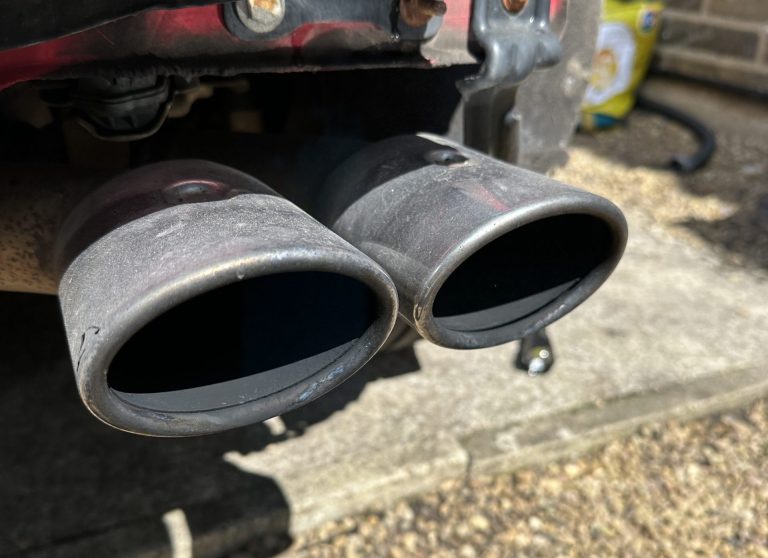
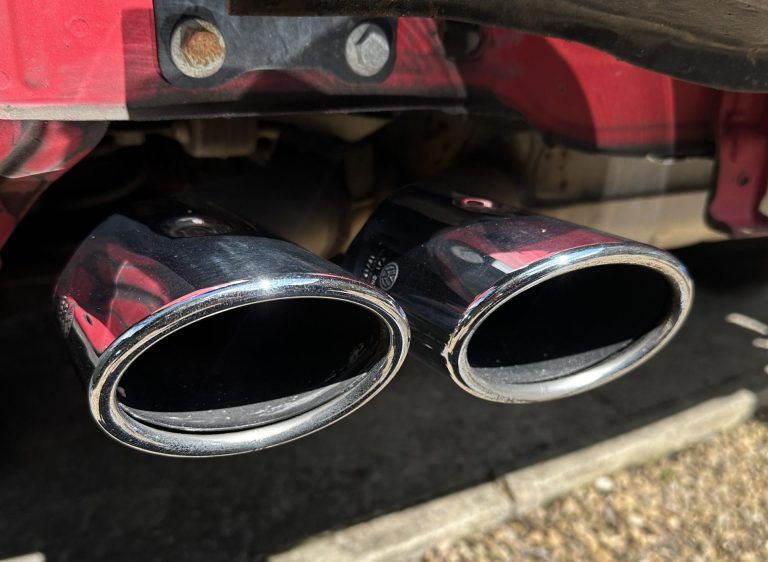
How Much Does it Cost to Get a Detail?
The cost of a car detailing service can vary widely depending on several factors. Let’s delve into a few of these elements to understand how they can influence the cost.
1. Area of the UK: Like many services, the cost of car detailing can depend on where in the UK you are based. Typically, services in major cities like London might be higher priced due to increased overhead costs for businesses. However, it’s always worth shopping around and comparing prices in your local area.
2. Ease of Working with the Paint: The condition and type of your vehicle’s paintwork can also affect the cost of detailing. Some paints, particularly those on older vehicles or darker colours, may require more time and specialised products for proper decontamination, correction, and protection. This can increase the overall cost.
3. Size of the Vehicle: The size and type of your vehicle can significantly impact the price of a detail. Larger vehicles, such as SUVs or vans, have more surface area to clean and protect than smaller cars, and hence, may incur a higher charge. Additionally, vehicles with complex shapes or features may require more time and precision, thus increasing the cost.
4. Products Used: The quality and type of products used during the detailing process can also influence the cost. High-end, professional-grade products may command a higher price due to their superior results. Specific services, such as ceramic coatings, which provide long-lasting protection and exceptional shine, are more expensive than traditional wax or sealant due to the product cost and the expertise required to apply them.
5. Level of Detailing Required: The level of detailing required can significantly influence the cost. Basic detailing services that include a thorough wash, interior cleaning and a simple wax or sealant application will be much less expensive than more advanced services like paint correction, ceramic coating, or engine detailing.
6. Condition of the Vehicle: If your vehicle is in a particularly poor state, it may require more intensive work to bring it back to its best. This might involve heavier paint correction, deep upholstery cleaning or even specialist treatments like odour removal. Consequently, the poorer the vehicle’s condition, the higher the detailing cost may be.
7. Professional Expertise: The expertise and reputation of the detailing professional can play a role in the cost. Experienced, well-regarded detailers may charge more for their services, but this often reflects their high level of skill, attention to detail and the quality of the finished result.
8. Custom Services: Any additional services or custom requests outside of the standard detailing package could also add to the cost. This could include things like headlight restoration, hard water spot removal, or applying a paint protection film.
View our article “How much is a Full Car Valet?“
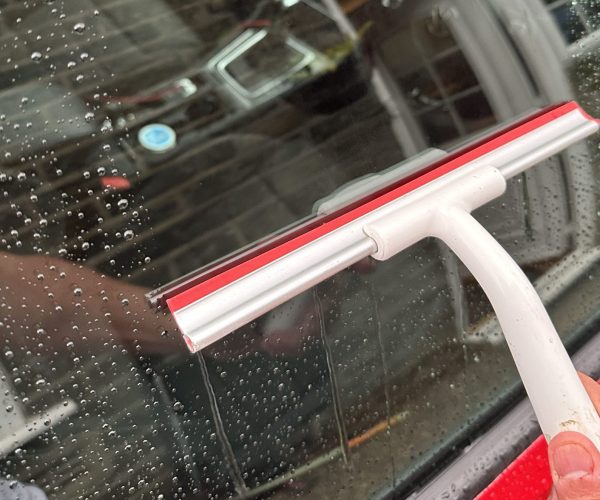
How Often Should I Get My Car Detailed?
Determining how often to get your car detailed can depend on a variety of factors, including your vehicle’s usage, exposure to environmental conditions, and your personal standards for cleanliness.
A good rule of thumb is to invest in a full detail every 4-5 months.
This interval ensures your vehicle maintains a high level of cleanliness and stays protected against the elements, while not becoming overly burdensome in terms of time or cost.
It’s important to note that car detailing and valeting are different processes. While valeting provides a good surface-level clean, it doesn’t offer the same depth of cleaning, restoration, and protection that a detailing service does. Thus, frequent valeting alone is not a substitute for regular detailing.
But that doesn’t mean valeting doesn’t have its place. Regular valeting, preferably done by detailing professionals, can be beneficial for maintaining your car’s cleanliness between detailing sessions. When performed by trained professionals, a valet service can keep your vehicle looking fresh and clean, without contributing to wear and tear on paint and other car surfaces. This is because they’ll use the right techniques and products that aren’t overly harsh or abrasive.
So, while detailing and paint correction services are a more intensive, deeper level of care, incorporating regular valets into your maintenance routine can keep your vehicle looking its best year-round. This combination ensures that your car always presents well, retains its value, and that any potential issues (like paint damage or interior spills) are addressed before they can become bigger problems.
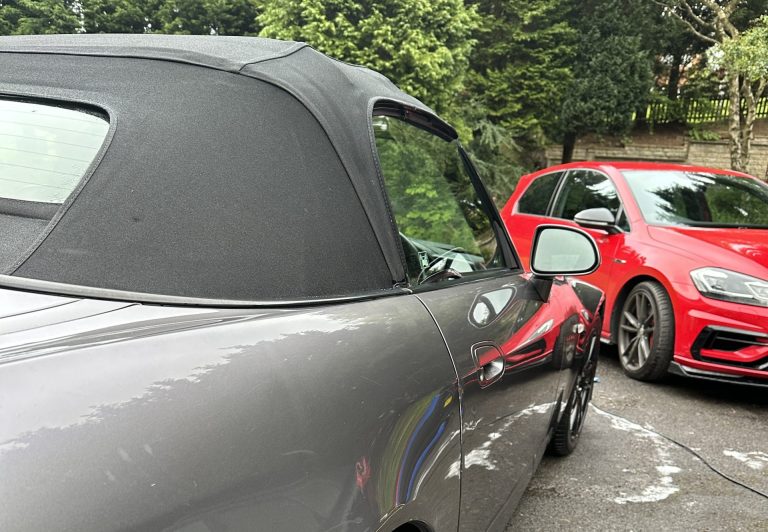
What are the stages when polishing a car?
1-Stage Polish
At the foundation of paint correction services is the 1-Stage Polish. This process utilises an all-in-one polish that combines the properties of a cutting compound and a finishing polish. The former handles minor imperfections such as light scratches and oxidation by levelling a microscopic layer of the clear coat. The finishing polish then steps in to refine the paint, enhancing its shine and overall clarity. The outcome, while noticeably improved, may not completely eliminate deeper paint defects. As the most straightforward and time-efficient service, a 1-Stage Polish is also the most cost-friendly option.
2-Stage Polish
A notch above is the 2-Stage Polish. It involves two distinct steps: cutting and finishing. The cutting stage uses a more abrasive compound to deal with deeper scratches and other severe paint defects, effectively removing another layer of the clear coat. However, the rigour of this stage might leave the paintwork slightly hazy. The finishing stage counteracts this by using a milder product to refine and smooth the surface, eradicating any haze and restoring the paint’s gloss and clarity. Offering a balance between thoroughness and cost, a 2-Stage Polish provides enhanced results, hence reflecting in a slightly higher price point.
3-Stage Polish
At the apex of paint correction is the 3-Stage Polish. This premium service begins with a heavy cutting stage to address severe paint defects. Following this, a medium polish stage further refines the paint surface. The third and final stage employs a finishing polish to maximise the gloss and reflection, achieving the highest possible level of shine and clarity. A 3-Stage Polish is the most comprehensive and time-consuming of the three, offering unmatched paint correction. As such, the price reflects the heightened labour and expertise involved, rendering it the most expensive of the three services.
In essence, the higher the stage number, the more extensive the process, and thus the higher the cost. It is crucial for customers to understand these stages and choose based on their vehicle’s condition, their desired outcome, and their budget. At North Detailing, we are committed to advising you on the most suitable service to ensure your vehicle looks its best without breaking the bank.
North Detailing
At North Detailing, we are more than just a car detailing service – we’re your partner in preserving the pride and joy that is your vehicle. Some may view car detailing as a mere luxury, but we believe it is far more than that – it’s an investment in your car’s longevity, an assertion of its quality, and a testament to your respect for things well cared for.
Our dedicated team understands the intricacies of every vehicle that comes into our care. We appreciate how every car tells a story and we consider it our duty to ensure that story remains as vibrant and captivating as the day it began.
By Tom Kelly North Detailing
